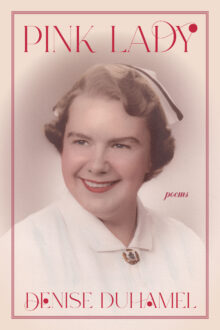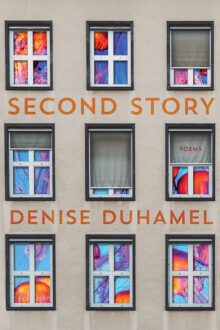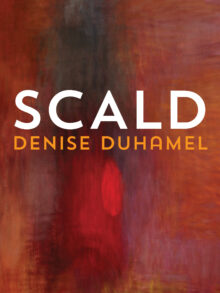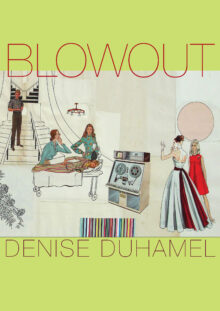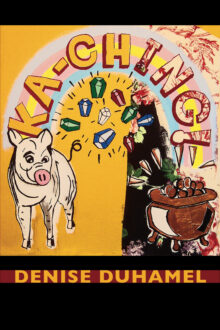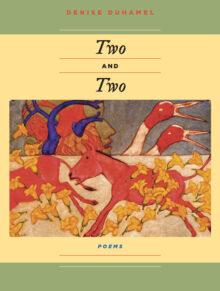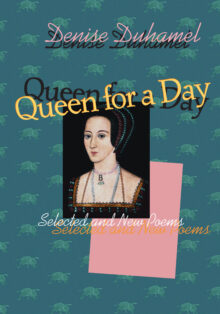
Denise Duhamel
Denise Duhamel is a distinguished university professor in the MFA program at Florida International University in Miami. Her previous books include Second Story, Scald, Blowout, Ka-Ching!, Two and Two, and Queen for a Day: Selected and New Poems. She is a recipient of fellowships from the Guggenheim Foundation and the National Endowment for the Arts.
Pink Lady
Poems
When her mother agrees to enter a Rhode Island nursing home in December of 2019, Denise Duhamel promises she’ll visit at least once a month. By March of 2020, everyone is in lockdown. The elegies in Pink Lady explore the resiliency of her elderly mother and nurses on the frontline, as well as the personal and universally experienced anxieties faced during pandemic policies. With focus, obsession, and even humor, Duhamel chronicles the separation of a mother and daughter, documenting the power of imagination, the aging body, and the limits of caregiving.
Second Story
Poems
When her Florida apartment is damaged by the ferocity of Hurricane Irma, Duhamel turns to Dante andterza rima, reconstructing the form into the long poem “Terza Irma.” Throughout the book she investigates our near-catastrophic ecological and political moment, hyperaware of her own complicity, resistance, and agency. She writes odes to her favorite uncle—who was “green” before it was a hashtag—and Mother Nature via a retro margarine commercial. She writes letters to her failing memory as well as to America’s amnesia. With fear of the water below and a burglar who enters through her second story window, she bravely faces the story under the story, the second story we often neglect to tell.
Excerpt from “Terza Irma”
I hoist my suitcase up the stairs, brace
myself as I open the door, slip
on water in the hall, and come face
to face with my books, the white shelves drip-
ping. I pull down Dante—the pages
heavy, wavy as potato chips—
then pat down the walls, trying to gauge
where the leak’s come from—the apartment
above? My ceiling’s dappled with beige
clouds I’m afraid will burst, a descent
of more indoor rain. I make my way
to the condo office, to lament
the havoc, ask for some help. My neigh-
bors are in varied states of panic
and shock, agitated castaways.
Scald
When her “smart” phone keeps asking her to autocorrect her name to Denise Richards, Denise Duhamel begins a journey that takes on celebrity, sex, reproduction, and religion with her characteristic wit and insight. The poems in Scald engage feminism in two ways—committing to and battling with—various principles and beliefs. Duhamel wrestles with foremothers and visionaries Shulamith Firestone, Andrea Dworkin, and Mary Daly as well as with pop culture figures such as Helen Reddy, Cyndi Lauper, and Bikini Kill. In dialogue with artists and writers such as Catherine Opie, Susan Faludi, and Eve Ensler, Duhamel tries to understand our cultural moment. While Duhamel's Scald can burn, she has more importantly taken on the role of the ancient Scandinavian “Skald,” one who pays tribute to heroic deeds. In Duhamel's case, her heroes are also heroines.
Blowout
Finalist, National Book Critics Circle Award.
In Blowout, Denise Duhamel asks the same question that Frankie Lyman & the Teenagers asked back in 1954—”Why Do Fools Fall in Love?” Duhamel’s poems readily admit that she is a love-struck fool, but also embrace the “crazy wisdom” of the Fool of the Tarot deck and the fool as entertainer or jester. From a kindergarten crush to a failed marriage and beyond, Duhamel explores the nature of romantic love and her own limitations. She also examines love through music, film, and history—Michelle and Barak Obama’s inauguration and Cleopatra’s ancient sex toy. Duhamel chronicles the perilous cruelties of love gone awry, but also reminds us of the compassion and transcendence in the aftermath. In “Having a Diet Coke with You,” she asserts that “love poems are the most difficult poems to write / because each poem contains its opposite its loss / and that no matter how fierce the love of a couple / one of them will leave the other / if not through betrayal / then through death.” Yet, in Blowout, Duhamel fiercely and foolishly embraces the poetry of love.
Ka-Ching!
Ka-Ching! is a book of poems that explores America’s obsession with money. It also includes a crown of sonnets about e-bay, sestinas on the subjects of Sean Penn and the main characters of fairytales, a pantoum that riffs on a childhood riddle, and a villanelle inspired by bathroom grafitti.
Two And Two
Denise Duhamel's much anticipated new collection begins with a revisionist tale–Noah is married to Joan of Arc–in a poem about America's often flawed sense of history. Throughout Two and Two, doubles abound: Noah's animals; Duhamel's parents as Jack and Jill in a near-fatal accident; an incestuous double sestina; a male/female pantoum; a dream and its interpretation; and translations of advertisements from English to Spanish. In two Möbius strip poems (shaped like the Twin Towers), Duhamel invites her readers to get out their scissors and tape and transform her poems into 3-D objects.
At the book's center is “Love Which Took Its Symmetry for Granted,” a gathering of journal entries, personal e-mails, and news reports into a collage of witness about September 11. A section of “Mille et un sentiments,” modeled on the lists of Hervé Le Tellier, Georges Perec, and George Brainard, breaks down emotions to their most basic levels, their 1,001 tiny recognitions. The book ends with “Carbó Frescos,” written in the form of an art guidebook from the 24th century.
Innovative and unpretentious, Duhamel uses twice the language usually available for poetry. She culls from the literary and nonliterary, from the Bible and product warning labels, from Woody Allen films and Hong Kong action movies–to say difficult things with astonishing accuracy. Two and Two is second to none.
Queen for a Day
Selected and New Poems
There’s no predicting a Denise Duhamel poem, except that it might be about something you’ve never seen in a poem before: Mr. Donut, Rodney King, or nude beaches; Gertrude Stein, phone sex, or the Girl Scouts. Poems from The Woman with Two Vaginas, a book that was censored when it first appeared, are based on Inuit folklore. How the Sky Fell offers revisionist fairy tales, and the poems from Kinky are inspired by Barbie dolls. In her new work, Duhamel suffers postmodern angst when using the “therapeutic I.” Denise Duhamel has startled readers of American poetry with work that pirouettes on a tightrope above the personal and the political, the spoken word and the page, the irreverent and the sacred. Queen for a Day showcases poems from her five previous collections, along with new work.

